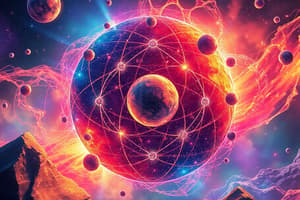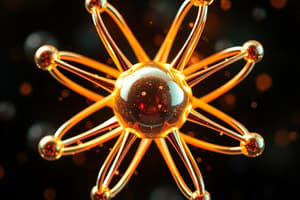Podcast
Questions and Answers
Who was the first to refer to the smallest particles composing matter as atoms?
Who was the first to refer to the smallest particles composing matter as atoms?
Democritus
What states that it is impossible to know both the energy level and the exact position of an electron at the same time?
What states that it is impossible to know both the energy level and the exact position of an electron at the same time?
Heisenberg Uncertainty Principle
A type of sublevel found in all principle energy levels is the...
A type of sublevel found in all principle energy levels is the...
s
Which atomic model helped explain line spectra?
Which atomic model helped explain line spectra?
The sum of the number of neutrons and the number of protons in the nucleus of an atom is...
The sum of the number of neutrons and the number of protons in the nucleus of an atom is...
Which principle describes how electrons fill orbitals?
Which principle describes how electrons fill orbitals?
What states that atoms of each element have unique sizes and properties?
What states that atoms of each element have unique sizes and properties?
What states that any sample of water always contains 8 g of oxygen for every 1 g of hydrogen?
What states that any sample of water always contains 8 g of oxygen for every 1 g of hydrogen?
Who discovered x-rays?
Who discovered x-rays?
What describes how electrons fill a sublevel?
What describes how electrons fill a sublevel?
Who developed cathode rays?
Who developed cathode rays?
Who developed the first atomic model?
Who developed the first atomic model?
What is a negatively charged ion?
What is a negatively charged ion?
Who first stated the discontinuity of matter?
Who first stated the discontinuity of matter?
Who is responsible for proposing the wave nature of the electron?
Who is responsible for proposing the wave nature of the electron?
Which subatomic particle has the greatest atomic mass?
Which subatomic particle has the greatest atomic mass?
Two electrons located in the same orbital have opposite spins is the...
Two electrons located in the same orbital have opposite spins is the...
Who discovered neutrons?
Who discovered neutrons?
Who developed the uncertainty principle?
Who developed the uncertainty principle?
Who discovered protons?
Who discovered protons?
Who discovered the prism spectroscope?
Who discovered the prism spectroscope?
Write the isotopic notation for sodium.
Write the isotopic notation for sodium.
Explain how atoms can be electrically neutral even though they contain charged particles.
Explain how atoms can be electrically neutral even though they contain charged particles.
Describe what happens to the outermost electron when a sodium atom is heated and made to give off a line spectrum.
Describe what happens to the outermost electron when a sodium atom is heated and made to give off a line spectrum.
What is the electron capacity for the s sublevel?
What is the electron capacity for the s sublevel?
What is the electron capacity for the p sublevel?
What is the electron capacity for the p sublevel?
What is the electron capacity for the d sublevel?
What is the electron capacity for the d sublevel?
What is the electron capacity for the f sublevel?
What is the electron capacity for the f sublevel?
What new technique do scientists use in order to image (see) atoms?
What new technique do scientists use in order to image (see) atoms?
How many valence electrons for barium?
How many valence electrons for barium?
How many valence electrons for phosphorus?
How many valence electrons for phosphorus?
How many valence electrons for krypton?
How many valence electrons for krypton?
State Dalton's atomic theory (3).
State Dalton's atomic theory (3).
Flashcards are hidden until you start studying
Study Notes
Atomic Concepts and Theories
- Democritus first identified atoms as the fundamental particles of matter.
- Dalton's atomic theory posits that elements consist of indestructible spheres, atoms combine to form compounds, and atoms of one element cannot transform into those of another element.
- Heisenberg Uncertainty Principle indicates simultaneous uncertainty in an electron's energy level and exact position.
Atomic Structure
- The mass number is the sum of neutrons and protons in an atom's nucleus.
- Anions are negatively charged ions formed when atoms gain electrons.
- Neutrons have the greatest atomic mass among subatomic particles.
Electron Configuration Principles
- The Aufbau principle describes the order in which electrons fill orbitals.
- Hund's rule states that electrons occupy each orbital singly before pairing up.
- Pauli exclusion principle asserts that no two electrons in the same orbital can have identical spins.
Electron Sublevels and Capacities
- The s sublevel can hold up to 2 electrons.
- The p sublevel has a capacity of 6 electrons.
- The d sublevel accommodates 10 electrons.
- The f sublevel can hold 14 electrons.
Historical Contributions
- John Dalton developed the first atomic model.
- J.J. Thomson created cathode rays and discovered electrons.
- Ernest Rutherford discovered protons through his experiments.
- James Chadwick identified neutrons.
- William Roentgen discovered x-rays, expanding the understanding of atomic particles.
Spectroscopy and Light Emission
- Bohr's model effectively explains the emission spectra of atoms.
- Heating a sodium atom causes the outermost electron to absorb energy, jump to a higher orbital, and release light upon returning to a lower orbital.
- The law of definite composition indicates that a specific ratio of elements is always present in a compound, such as water containing 8 g of oxygen for every 1 g of hydrogen.
Advanced Imaging and Techniques
- A scanning tunneling microscope is a modern tool used to visualize atomic structures accurately.
Valence Electrons
- Barium has 2 valence electrons.
- Phosphorus possesses 5 valence electrons.
- Krypton has a full complement of 8 valence electrons.
Isotopic Notation
- The isotopic notation for sodium is represented as (^{23}_{11}Na).
Studying That Suits You
Use AI to generate personalized quizzes and flashcards to suit your learning preferences.




